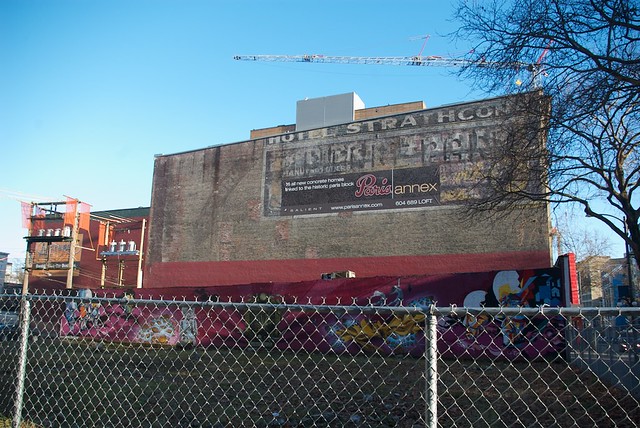In a letter written to City Council in advance of this Thursday's vote on approving new condo developments in the Downtown Eastside, former Vancouver Mayor and BC Premier Mike Harcourt has written a letter to the current Mayor and City Council criticizing their approach to community development in the area.
Harcourt emphasizes that the City's proposed rezoning package would not only increase building height, but would of course add density to the area - a new group of residents would be brought into the neighbourhood. Without an actual plan, rents will go up, and the things that current residents need and enjoy will be priced-out of existence.
Harcourt writes:
It is well known that this is a uniquely sensitive area of the city. Shifts in its populations brought on by inadequately considered rezoning could be extremely harmful to the affected communities. Unforeseen displacements, deficiencies in services and amenities, and disruption of community assets may well result.
Harcourt suggests that the City should do an analysis of the impact of such demographic shifts before making decisions about particular rezonings. More importantly, community development should take a holistic approach that recognizes and addresses social issues: "We question why there is priority for this 'height-only' study when there is a serious lack of overall social, economic and environmental planning for the DTES?" asks Harcourt.
Here is the full letter:
Building Community Society
Chair: Mike Harcourt
January 12, 2011Dear Mayor Robertson and Councillors:
Re January 20, 2011 Council Meeting on the Historic Area Height Review Update.
It appears that the search for higher buildings in the historic area has been motivated primarily to locate sites where increases in floor space could be achieved on redevelopment, thereby increasing the value of those sites. The Council that initiated the study had anticipated that the uplift in value would be shared between the developer and the City, providing resources for the City to achieve some public amenities, including low income housing, while at the same time seeing new development and improvement to the DTES.
Initially, it appeared that the city thought there could be many potential high-rise sites where significantly higher densities could be achieved. However, after much staff and many consultant studies, and subsequent community consultation, council determined not to pursue additional high-rise towers and to limit the additional heights up to 120 ft. and a few sites that would be restricted to a maximum height of approximately 150 ft. The staff report now before council recommends some increases in height and identifies seven specific sites which may go 150 ft. but does not describe what additional amounts or types of floor space would be achieved beyond what is permitted in existing zoning, nor does it describe what amount of anticipated public benefit will be achieved by the additional height (or density).
We believe that this long debate about higher buildings, (and especially the unmentioned higher densities), is incomplete without an analysis of the impacts of such densities and the associated population shifts on the overall social, economic and environmental circumstances of the Downtown Eastside. It is well known that this is a uniquely sensitive area of the city. Shifts in its populations brought on by inadequately considered rezoning could be extremely harmful to the affected communities. Unforeseen displacements, deficiencies in services and amenities, and disruption of community assets may well result.
We question why there is priority for this “height-only” study when there is a serious lack of overall social, economic and environmental planning for the DTES? The Strathcona Revitalization Committee and the Carnegie Community Action Project have drawn up their own plans and Council has yet to respond to them.
In a similar vein, the City has launched a participatory engagement process with the low Income community to create a locally-based Social Impact Assessment framework to “assess the effect on the existing low-income community of new developments in the historic area and where opportunities for enhanced affordability and live-ability may be achieved.” There is no explanation as to how this initiative and the Height Study relate or how both mesh with the future of the DTES.
CONCLUSIONS
Because of the major social, economic and environmental issues at stake here, the BCS recommends that no rezoning should be entertained until a local area planning committee has been established and has begun the process of analysis that establishes the priorities of planning and development opportunities for the well being of the Downtown Eastside community as a whole.Sincerely,
Mike Harcourt
Chair















